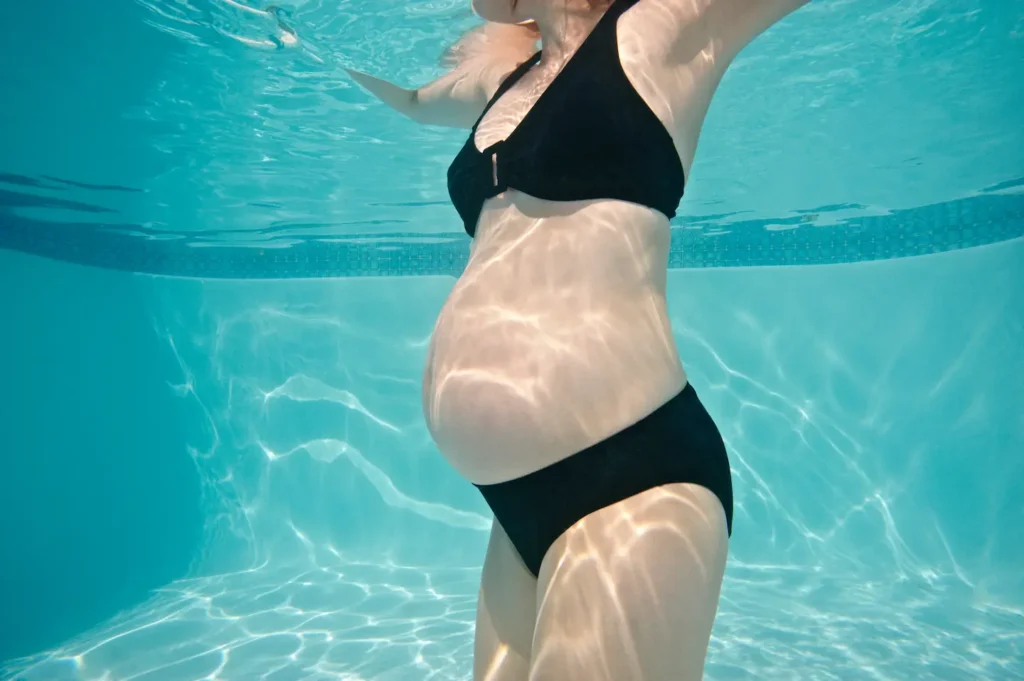Swimming is widely recognised as a beneficial form of exercise for a variety of individuals, including pregnant women. Concerns regarding the safety of swimming when pregnant, such as the potential for exercise to affect the baby, the risk of infection from public pools and the suitability of swimming movements, are common. Yet, the consensus among health professionals is clear: swimming is an excellent, low-impact exercise for pregnant women, recommended by community midwives for its numerous health benefits.
Why Swimming is Beneficial During Pregnancy
Swimming provides unique support for pregnant women due to the buoyancy of water. Up to 90% of body weight can be supported in water! This natural support system helps to bear the extra weight, offering a sensation of weightlessness that can significantly alleviate discomfort, particularly in the later stages of pregnancy.
Effective Pain Relief
This principle of buoyancy and the soothing effect of water is also why immersion in a water bath or pool is recommended as a pain relief method during labour. Moreover, the water’s buoyancy effectively relieves pelvic girdle pain by relaxing muscles and joints and providing a gentle form of pain relief.
Natural Cooling Effect During Exercise
During pregnancy, a woman’s body undergoes significant changes, including an increase in blood volume and metabolic rate. This increase in metabolism generates more heat, which makes pregnant women feel warmer and more prone to overheating, especially in warm environments or during physical activity.
Swimming provides a natural cooling effect because the water temperature is typically lower than the body’s temperature. The water’s cooling effect ensures that during physical activity the body remains at a more regulated temperature, making swimming an ideal exercise for pregnant women concerned about overheating.
Releases Natural Endorphins
Swimming helps circulation and can ease swelling in the legs and feet. It is also stress-busting and can help promote sleep. The natural endorphins released when swimming provide pain relief and promote a general feel-good factor that can bring tranquillity and calm.
Starting Swimming When Pregnant
For those new to swimming or returning to the pool while pregnant, beginning with moderation is key. A gentle swim for 20-30 minutes can introduce the body to the benefits of swimming without overexertion. Gradually, as comfort and endurance improve, the duration of swimming sessions can be extended.

Aquanatal classes, designed with the needs of pregnant women in mind, focus on water exercises that are both safe and beneficial, offering an alternative to traditional swimming sessions. However, it’s always recommended to check with your doctor first before starting any new exercise programme when pregnant.
Safety Considerations for Swimming While Pregnant
When swimming during pregnancy, several safety precautions can ensure a healthy and comfortable experience.
Pool Temperature
The ideal temperature range for pool water is between 27°C and 33°C. This range ensures the environment is safe and comfortable for both the pregnant mother-to-be and their baby. If you are using a hydrotherapy pool, the temperature should not be above 35°C.
At Swim Central, we maintain our pool temperatures at an optimal 30–31°C. This specific temperature range is carefully chosen to ensure the environment is not only safe but also exceptionally comfortable for pregnant women.
Chlorine and Water Quality
Concerns about chlorine exposure are understandable, but chlorine levels in public pools are generally considered safe for pregnant women. David M. Priver, MD, FACOG, notes that chlorine, when properly managed, poses no significant risk: ‘I tell them that if you combine chlorine with sodium, you get table salt. Moderate exposure is fine.’ However, if anyone finds themselves sensitive to chlorine or other irritants, reducing exposure and consulting with a healthcare provider is advisable.
Safe Swimming Strokes
In the early stages of pregnancy, all strokes are good. However, in the second and third trimesters, breaststroke may not be suitable if you have encountered pelvic girdle pain or sciatic pain because the moment of the legs can exacerbate any discomfort in the back and hips.
Staying Hydrated
It’s essential to stay hydrated, particularly when exercising, and this includes activities like swimming. While in water, it’s easy to underestimate the amount of fluid lost through sweat because swimming naturally cools the body and masks the signs of dehydration. For pregnant women, maintaining hydration becomes even more critical due to the increased demands on their body.
Therefore, it’s recommended to drink at least one glass (approximately 250 ml) of water every 60 minutes during swimming sessions. It’s also important to hydrate before getting into the pool and immediately after the session ends to replenish any fluids lost.
Nutrition For Swimming
Proper nutrition before and after swimming supports both energy levels and recovery. Eating a balanced meal a few hours before swimming or a light snack 30 minutes before entering the pool can help maintain energy. Protein-rich foods, such as eggs or a banana with peanut butter, are excellent choices to replenish your energy.
To Conclude
Swimming is a fantastic way for pregnant women to stay active and reap significant physical and mental benefits. The buoyancy of water provides support to alleviate joint pain and the pressure of carrying extra weight. It offers a refreshing way to exercise without overheating, and the release of endorphins contributes to relaxation and stress reduction. While safety concerns are understandable, swimming in well-maintained pools is generally safe for pregnant women.
If you’re expecting, talk to your doctor and consider trying swimming or aquanatal classes for a comfortable and enjoyable workout. Book your swim session at Swim Central today!

